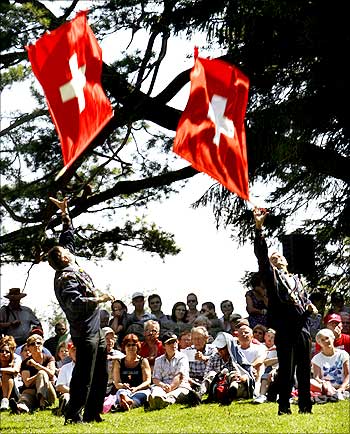
Vibrant financial markets and a sound banking sector has helped Indian economy move up a notch to 49th place on the global competitive scale, while Switzerland has toppled the United States as the top-ranked nation, the World Economic Forum said on Tuesday.
The US has slipped to the second place and is followed by Singapore, Sweden and Denmark in the top five, according to the annual ranking of the world's most competitive economies.
India: #49
India is up one position at 49th. India's GDP has grown 6.6 per cent per year on average since 1991, when many economic reforms began in earnest, yet its GDP per capita remains just above $1,000 -- a third and a tenth, respectively, of those in China and Russia.
A wide gap also remains between rural India and its thriving economic and technological hubs. India hosts some of the best universities in the world, and a number of Indian corporate giants have become major global players or even leaders in their fields.
At the same time, some 42 per cent of the population lives on less than $1.25 a day (in PPP international dollars), more than twice China's equivalent figure.
Mirroring this dichotomy, India's competitive performance continues to exhibit a rather reversed development pattern.
It ranks an outstanding 28th in the most complex areas measured by the business sophistication and innovation subindex, ahead of several advanced economies.
The country also boasts fairly well functioning institutions (54th), bustling financial markets (16th), and a sound banking sector (25th) supported by a vast domestic market (4th largest in PPP terms).

Switzerland: #1
Among the 133 countries featuring in the list, three nations in the BRIC grouping -- India, China and Brazil -- have moved up the competitiveness ladder while Russia has witnessed a sharp drop.
Both India and China have moved up one place to 49th and 29th positions, respectively, in the latest ranking.
Switzerland overtakes the United States this year as the world's most competitive economy.
This is explained by the fact that Switzerland's performance has remained relatively stable, whereas the United States has seen a weakening across a number of areas.
Switzerland's economy continues to be characterized by an excellent capacity for innovation and a very sophisticated business culture, ranked 3rd for its business sophistication and 2nd for its innovation capacity.
The country is characterized by high spending on R&D. Switzerland's scientific research institutions are among the world's best, and the strong collaboration between the academic and business sectors ensures that much of this research is translated into marketable products and processes, reinforced by strong intellectual property protection.
This strong innovative capacity is captured by the high rate of patenting (148.27 per million inhabitants) in the country, for which Switzerland ranks 7th worldwide on a per capita basis.
Switzerland's public institutions are rated among the most effective and transparent in the world (7th), ensuring a level playing field and enhancing business confidence; these include an independent judiciary, a strong rule of law, and a highly accountable public sector.
Competitiveness is also buttressed by excellent infrastructure (5th) and a well-functioning goods market (5th), as well as a labor market that is among the most efficient in the world (2nd, just behind Singapore).

USA: #2
Last year, India was at the 50th spot while China stood at 30th place. Brazil has improved its rank by eight places to 56 this year.
However, Russia has slumped to the 63rd place from 51 in the Global Competitiveness Index 2009-2010.
"India's competitive performance continues to exhibit a rather reversed development pattern. It precedes many advanced economies in terms of business sophistication and innovation capacity.
India also boasts bustling financial markets and a sound banking sector, supported by well-functioning institutions," WEF said.
After several years at the top of the rankings, the United States falls one place and is ranked 2nd this year.
The country continues to be endowed with many structural features that make its economy extremely productive and that place it on a strong footing to ride out business cycle shifts and economic shocks.
However, a number of escalating weaknesses have taken their toll on the US ranking this year. The United States is home to highly sophisticated and innovative companies operating in very efficient factor markets.
The country is also endowed with an excellent university system that collaborates strongly with the business sector in R&D.
Combined with the scale opportunities afforded by the sheer size of its domestic economy -- the largest in the world by far -- these qualities continue to make the United States very competitive.
Labour markets are ranked 3rd, characterized by the ease and affordability of hiring workers and significant wage flexibility.
The country's goods markets (12th) are also characterized by low levels of distortion within the context of a very competitive environment. Although the country is very competitive overall, there are some weaknesses in particular areas that have deepened since the last assessment.

Singapore: #3
In terms of well-functioning institutions, India is at the 54th place while at 16th and 25th spots in terms of bustling financial markets and a sound banking sector supported by a vast domestic market.
Singapore moves up two ranks to 3rd place, remaining the highest-ranked country from Asia.
The country's institutions continue to be ranked as the best the world; at a time when confidence in governments in many countries has diminished, they are assessed even more strongly than in past years.
Singapore places 1st for the efficiency of its goods and labour markets and 2nd for its financial market sophistication, ensuring the proper allocation of these factors to their best use.
Singapore also has world-class infrastructure (ranked 4th), leading the world in the quality of its roads, ports, and air transport facilities. In addition, the country's competitiveness is propped up by a strong focus on education, providing highly skilled individuals for the workforce.
In order to strengthen its competitiveness further, Singapore could encourage even stronger adoption of the latest technologies -- especially broadband Internet -- as well as the innovative capacity of its companies.

Sweden: #4
On the other hand, the report noted that India under performs in some of the basic determinants of competitiveness, in particular infrastructure, health and primary education.
The Nordic members of the European Union continue to hold privileged positions in the rankings. Sweden, Finland, and Denmark hold the 4th through the 6th places. They continue to lead the rankings in a number of individual areas.
For example, they are all ranked among the top 15 countries with regard to macroeconomic stability, all running healthy budget surpluses through 2008, with low levels of public indebtedness, high national savings, and narrow interest rate spreads.
The three countries have among the best functioning and most transparent institutions in the world, ranked behind only Singapore on this pillar, as in past years.

Denmark: #5
"In addition, penetration rates for mobile telephony (116th), the Internet (104th), and personal computers (96th) remain among the lowest in the world, while inefficiencies in the labour market (83rd) prevent an optimal allocation of human capital.
Finland, Denmark, and Sweden also continue to occupy the top three positions in the higher education and training pillar, the result of a strong focus on education over recent decades.
This has provided the workforce with the skills needed to adapt rapidly to a changing environment and has laid the ground for their high levels of technological adoption and innovation, which is crucial for countries at their advanced stage of economic development.
Notably, amid the economic and financial crisis, all three countries' financial markets continue to receive high scores, with Finland and Denmark ranked 7th and 8th, respectively, and Sweden close behind at 12th.

Finland: #6
"Improvement in these areas would place India on a stronger growth trajectory going into the future," WEF said. The ranking is based on twelve factors of competitiveness, including institutions, infrastructure, macroeconomic stability, health and primary education, higher education and training.
A marked difference among these three Nordic countries relates to labour market flexibility. Denmark continues to distinguish itself as having one of the most flexible and efficient labour markets internationally (ranked 5th).
In Finland and Sweden, however -- as in a number of other European countries -- companies have less flexibility in setting wages, and firing and therefore hiring workers is deemed expensive, although cooperation in labour-employer relations is good in all three countries.

Germany: #7
Other criteria taken into consideration are goods market efficiency, labour market efficiency, financial market sophistication, technological readiness, market size, business sophistication and innovation.
Germany remains stable at 7th place. The country is ranked 1st for the quality of its infrastructure, a position it has held for some time, with particularly good marks for its transport and telephony infrastructure.
Its goods market is assessed as being efficient (18th), with a high level of competition among companies (21st).The financial market also continues to receive relatively good marks, although the ranking has dropped in this area from19th to 36th, with rising concerns about the soundness of banks and more difficult access to capital for business development.
Germany has very sophisticated businesses, ranked 2nd, just behind Japan. These attributes allow Germany to benefit greatly from its significant market size (5th). On the other hand, Germany's labor market remains very rigid (124th for the labor market flexibility subpillar), where a lack of flexibility in wage determination and the high cost of firing provide a hindrance to job creation.

Japan: #8
"Switzerland is the most competitive country overtaking the United States, which falls to second position, with weakening in its financial markets and macroeconomic stability," the report said.
Japan moves up one place to 8th overall, mainly by maintaining its performance compared with last year, while other countries in the top 10 have weakened.
Japan continues to enjoy a major competitive edge in the areas of business sophistication and innovation, ranked 1st and 4th, respectively, in these two pillars.
The country benefits from the strong availability of scientists and engineers and high company spending on R&D (2nd on both indicators) as well as a capacity for innovation that is second to none.
Indeed, in terms of innovation output this pays off with a rate of patenting per capita (263.35 per million inhabitants) that is 2nd worldwide.
The country's overall competitive performance, however, continues to be dragged down by its macroeconomic weaknesses, with high budget deficits over several years (ranked 115th in 2008), which have led to the buildup of one of the highest public debt levels in the world (196.29 per cent of GDP in 2008, corresponding to a 132nd rank, or second to last on this indicator).
Japan's rise in the rankings can in large part be traced to the fact that its main areas of weakness, linked to macroeconomic instability and questions about the soundness of its banks, for example, have now become concerns for many other countries.

Canada: #9
According to the WEF, the survey this year polled more than 13,000 business leaders in 133 economies. "The survey is designed to capture a broad range of factors affecting an economy's business climate," it added.
Canada moves up one more place this year to 9th, having joined the top 10 last year.
Canada benefits from excellent transport and telephony infrastructure (7th for the infrastructure pillar), highly efficient markets, particularly labor and financial markets (ranked 7th and 11th, respectively), and well-functioning and transparent institutions (17th).
In addition, the country has been successful in nurturing its human resources: it is ranked 7th for health and primary education and 9th for higher education and training.
This has paved the way for the country's workforce to adopt the latest technologies for productivity enhancements (ranked 11th). Further, at a time when many industrialized and developing countries alike are struggling with macroeconomic instability, Canada has improved in this area since last year, rising from 43rd to 31st.
Continuing to reduce the debt level will be important for ensuring the Canadian government's ability to meet its future liabilities and grow in a sustainable way.

The Netherelands: #10
Other countries in the top ten are Finland (6), Germany (7), Japan ( 8), Canada ( 9) and the Netherlands (10).
The Netherlands drops two places to 10th place, rounding out the top 10.
The country's companies are highly sophisticated (ranked 6th on the business sophistication pillar) and are among the most aggressive internationally in absorbing new technologies (ranked 2nd for their technological readiness, just behind Sweden).
Business activity is buttressed by an excellent educational system and efficient factor markets, especially goods markets, which are ranked 6th overall.
The Netherlands is also characterized by a comparatively stable macroeconomic environment, improving on a relative basis compared with last year.
The drop in the rankings can be traced mainly to a weaker assessment of its financial markets, which have dropped from 11th to 23rd overall, linked, as in many countries, to concerns about the solvency of the banking sector and more difficult access to credit.